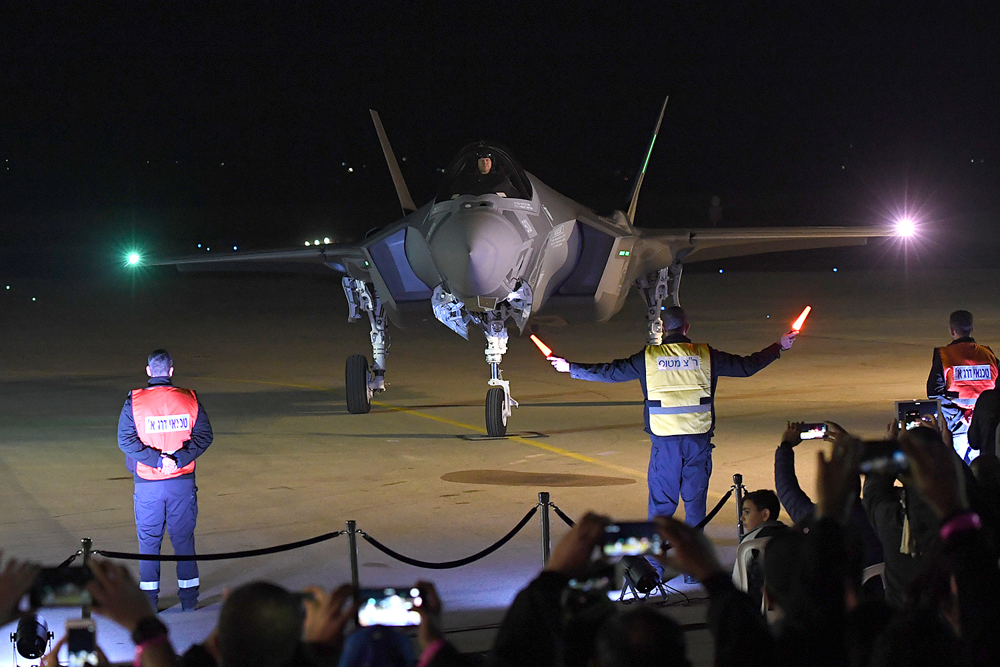In 2025 U.S. military aid to the Middle East surged, especially to Israel under President Trump’s new term. The Pentagon and State Department have approved emergency arms transfers worth tens of billions of dollars to Israel – including massive bomb stockpiles and heavy equipment – while also brokering record‐breaking deals with Gulf partners. For example, in February 2025 the State Department quietly approved nearly $3 billion in munitions for Israel on an emergency basis. The package included 35,529 general‑purpose bomb bodies (2,000‑pound GPS‑guided bombs) and 4,000 ‘bunker-buster’ 2,000‑lb bombs, along with 5,000 one‑ton bombs and corresponding guidance kitsreuters.com. It also included Caterpillar D9 armored bulldozers – worth ~$295 million – used by the Israeli army for clearing and fortificationreuters.comreuters.com. These sales were approved under the expedited emergency process (bypassing normal congressional review) and set to begin deliveries starting 2026, though stocks on hand could be shipped immediatelyreuters.comreuters.com.

Meanwhile, U.S. officials reaffirmed that supporting Israel’s qualitative edge remains a national priority. In August 2024 (preceding 2025) the State Department approved a $20 billion sale of F‑15I Ra’am fighter jets and other equipmentreuters.com. The Pentagon argued “it is vital to U.S. national interests to assist Israel to develop and maintain a strong and ready self-defense capability”reuters.com. Israeli leaders echoed this, thanking the U.S. for helping maintain Israel’s “qualitative military edge” in the regionreuters.com. The U.S. has also sent over 10,000 GPS‑guided 2,000‑lb bombs and thousands of Hellfire missiles to Israel since the Gaza war beganreuters.com. (Trump’s team has already approved billions more in sales and even sidestepped some congressional reviews to fast-track themreuters.comreuters.com.)

These massive arms shipments have significant implications. Domestically, U.S. support for Israel remains broad but not unchallenged. Congressional allies of Israel routinely defend the sales as critical to U.S. and Israeli securityreuters.comreuters.com, arguing that stopping aid would “abandon Israel, our closest ally in the Middle East”reuters.com. Critics, however, point to the humanitarian costs in Gaza and to Israel’s heavy civilian casualties. For example, Senator Sanders warned before the April vote that the Gaza bombing has left “thousands of children facing malnutrition and starvation” with virtually no aid reaching Gazareuters.com. Several progressives introduced measures to halt transfers on those grounds – measures that repeatedly failed in Congressreuters.comreuters.com. Even some moderate voices (like Sen. Tammy Baldwin) abstained, reflecting the tension between Israel support and humanitarian concernsreuters.com.
Trump’s personal role has amplified the debate. He has forged very close ties with Israel’s current government, publicly pledging to back Prime Minister Netanyahu “in his war against Hamas”reuters.com. On day one he rescinded sanctions on West Bank settlers and told aides to push forward even smaller weapons sales that Biden had pausedreuters.com. In practice his administration has overridden congressional holds and accelerated approvals of billions more in hardware for Israelreuters.comreuters.com. Trump has also floated unconventional plans – most notoriously, proposing that the U.S. take over Gaza and resettle Palestinians abroad. In May 2025 he told a business roundtable in Qatar that Washington would “make [Gaza] a freedom zone” by moving Palestinians out and redeveloping itreuters.comreuters.com. Reuters notes this idea “drew global condemnation,” with Palestinians, Arab states and the U.N. likening it to ethnic cleansingreuters.com. Jordan’s King Abdullah and Egypt’s leaders were swift to denounce Trump’s “takeover” proposal: Jordan publicly “rejected any attempts to annex land and displace the Palestinians”reuters.com, and Egypt rallied its Arab partners to restate the principle of a two‑state solution and to warn that forced relocation would be a “flagrant violation of international law” threatening regional stabilityreuters.comreuters.com. Even in the Gulf, Saudi officials (while signing the arms pact) made clear they expect progress on Palestinians as part of normalization; Al Jazeera observed Riyadh still insists on a Palestinian state for true peacealjazeera.comaljazeera.com.
Analysts note that Trump’s moves – including his anti-Iran hawkishness (he fired a senior adviser who discussed strikes on Iran without himforeignpolicy.com) – seem driven as much by realpolitik as by ideological lobbying. A Foreign Policy columnist observed that, despite Trump’s reputation as staunchly pro-Israel, his May 2025 Middle East tour deliberately skipped Israel (despite Netanyahu’s lobbying) in favor of Gulf statesforeignpolicy.com. He brokered a Houthi ceasefire in Yemen even though the Houthis oppose Israel, and he removed an aide for liaising with Israeli officials on Iran. These moves suggest Trump often prioritizes transactional U.S. interests (“America First”) over any narrow “Zionist” agendaforeignpolicy.comreuters.com. Still, Trump remains politically intertwined with pro‑Israel constituencies: his campaigns enjoy support from key donors who back Israel, and his advisers and coalition include several prominent pro-Israel figures.
That brings us to lobbying. The influence of pro-Israel groups on U.S. foreign policy is widely discussed. Reuters reports highlight that the American Israel Public Affairs Committee (AIPAC) and its affiliated PACs have become major funders in U.S. politics. Its super-PAC, the United Democracy Project, raised nearly $50 million in the 2024 cycle and spent over $18 million to bolster candidates (Democrat or Republican) seen as strong on Israelreuters.com. Top donors to this pro-Israel effort include billionaire investors who back Donald Trump, as well as those who fund Democratic causesreuters.com. AIPAC insists its sole criteria is “candidates…[who] strengthen the U.S.-Israel relationship” and points out its donations go to both partiesreuters.com. Pro-Israel lobbyists publicly argue that support for Israel is bipartisan — even “entirely consistent with progressive values,” as one AIPAC spokesperson put itreuters.com. Meanwhile, progressive activists are pushing back. A coalition of left-wing groups has urged Democrats (including Biden) to “reject AIPAC” contributions, arguing that the lobby’s cash may pressure officials to ignore Palestinian rightsreuters.com. These critics explicitly accuse AIPAC of wielding a “destructive influence” by directing millions to influence U.S. policyreuters.comreuters.com. (AIPAC counters that it spends for incumbents across the aisle — including to support the Congressional Black Caucus and other diverse groupsreuters.com.) Regardless, the debate over lobbying highlights why unwavering arms support has broad congressional backing: many lawmakers fear political blowback from donors and constituents if they oppose Israel aid.
Globally, the U.S.’s robust arming of Israel has provoked sharp reactions. In the Arab world and the broader Global South, Trump’s Gaza proposals and U.S. arms transfers are often cited as evidence of American double standards. Palestinian officials and Arab governments have expressed outrage at continued U.S. supplies while Gaza endures siege conditions. For instance, Egypt’s foreign ministry coordinated an Arab statement condemning any displacement of Gaza’s population, calling Trump’s plan a “threat to security and stability in the region”reuters.com. Jordan explicitly warned that resettlement plans would “further inflame domestic unrest” given its own large Palestinian populationreuters.com. Turkey’s president (known as a Gaza war critic) has regularly denounced U.S. arms shipments to Israel, accusing Washington of “writing history with bloody hands”reuters.com. On the world stage, even Russia and China have weighed in on related issues. Russia, which has recently deepened ties with both Israel’s rivals Iran and Syria, publicly defended Iran’s “right to peaceful atomic energy” just as the U.S. and Israel prepared negotiations on Iran’s programreuters.com. Xi Jinping and Vladimir Putin have declared they will “decisively counter” U.S. policies they portray as bullyingreuters.comreuters.com – indirectly signaling support for countries challenged by U.S. pressure.
Civil society reactions in the West have also been notable. In the U.S., pro-Palestinian rallies and campus encampments (notably at Columbia, NYU, and elsewhere) have grown into a major movement this year, demanding a permanent Gaza ceasefire and an end to U.S. military aid to Israelreuters.com. Thousands have marched on Capitol Hill and college campuses carrying signs like “Stop Arming Israel” and “Ceasefire Now.” Their demands explicitly include suspending arms sales to Israel and divesting from defense contractors linked to the warreuters.com. University administrations and local police have sometimes clashed with these protesters, but the demonstrations show a rising public controversy over whether U.S. weapons should continue flowing as before. Internationally, street protests and UN General Assembly resolutions (with broad Non-Aligned Movement support) have called on states to halt arms to Israel. While U.S. policy remains unchanged, these global voices underscore the isolating effect the current arms policy has – many countries see it as abetting a war with heavy civilian toll.
In summary, the early 2025 picture is one of unabated U.S. military backing for Israel and its Arab allies. Recent events — emergency bomb shipments, historic Gulf arms deals, and Trump’s own public statements — have reinforced a “strong Israel” posture. Congressional reports and administration fact sheets emphasize the security rationale (preserving Israel’s edgereuters.com, countering Iran, strengthening alliances). But critics – from progressive activists to foreign governments – warn that such policies exacerbate Middle East tensions and undermine U.S. credibility as a peacemaker. They point out that U.S. aid is increasingly seen through the prism of one-sidedness: with Gaza devastated and Palestinians displaced, continued U.S. armament of Israel is viewed by many in the Arab world and beyond as fueling conflict rather than containing it. Whether in Congress, on campuses, or abroad, voices are rising that demand Washington reconsider at least some elements of its policy – for example by tying aid to humanitarian conditions or progress on peace effortsreuters.comreuters.com. For now, however, the balance of power in Washington remains firmly pro-Israel. The influence of pro-Israel political networks, combined with Trump’s vocal alliance with Netanyahu, suggests that substantial U.S. military support for Israel will continue through 2025 – a development that will keep shaping regional dynamics for years to comereuters.comreuters.com.
Sources: Contemporary news reports and analyses from Reuters and major outlets detail these events. For example, Congressional votes on April 3, 2025, were covered by Reutersreuters.com; arms sale announcements by Reuters and others in early 2025reuters.comreuters.comreuters.com; and discussions of political influence in U.S. elections by Reuters and analystsreuters.comreuters.com. Commentary from Foreign Policy and Al Jazeera provide context on Trump’s diplomacy and regional reactionsforeignpolicy.comaljazeera.com. The embedded images illustrate the kinds of hardware and scenes involved (Israeli F‑35 fighters and IDF Caterpillar bulldozers) – examples of the very weapons systems at issue.